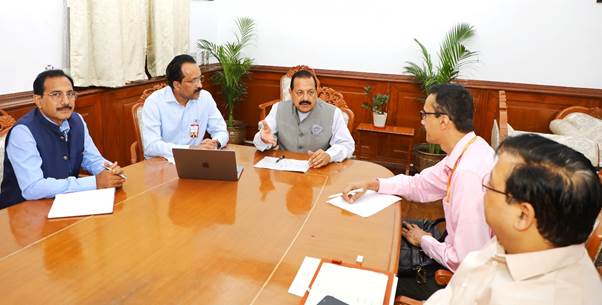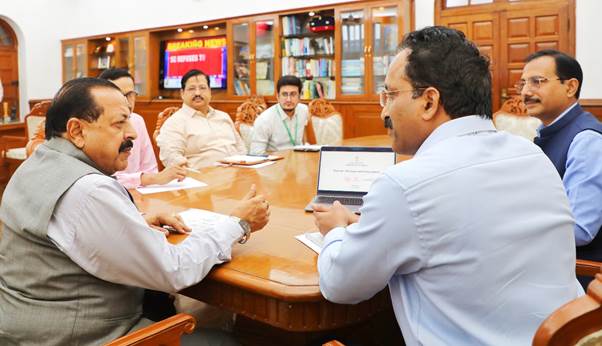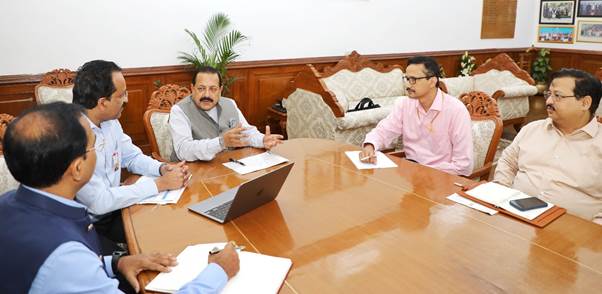“There has been around 200 times increase in Space StartUps in just about two years,” said Dr. Jitendra Singh, Union Minister of State (Independent Charge) for Science & Technology, Minister of State (Independent Charge) for Earth Sciences, MoS PMO, Department of Atomic Energy, Department of Space,Personnel, Public Grievances and Pensions, here at New Delhi today.
This quantum jump has been possible because of a major policy decision taken by Prime Minister Narendra Modi to open up the Space sector to the private sector and allow public-private participation in a big way, said the Minister.

Dr Jitendra Singh was chairing a high-level meeting to review the 100 days Action Plan of the Department of Space. He took stock of the present status, the opportunities and future space missions of India’s space sector.
Chairman ISRO, S. Somanath, his team and senior officials were present in the meeting.
During the meeting, the Minister mentioned that Space StartUps have increased from 1 in 2022 to nearly 200 in 2024, witnessing an unprecedented rise of 200 times in these years. In the year 2023 alone, nearly INR 1000 crore was invested in the space sector of India in just about eight months.

Further, the industry caters to nearly 450 MSMEs affirming the PM’s vision of “Sabka Prayas” during the Amrit kaal period.
Giving further insights into the space sector, Dr. Jitendra Singh said that the share of India in the global space economy by 2030 is going to rise 4 times in comparison to 2021. In 2021, the Indian space industry contributed 2% to global share. This is expected to rise to 8% by 2030 and further to 15% by the year 2047.
DoPT minister and Chairman ISRO also briefly touched upon the rising involvement of the private sector in the space missions. Presently India allows 100% FDI in the space sector thereby unleashing new horizons of innovation and growth to the sector.
According to Jitendra Singh the private sector can offer new solutions to development of advanced small satellites, geospatial technologies, orbital transfer vehicles and so forth.

Further touching upon the contribution of science to Indian society, Dr. Singh said that private players will play a huge role in sectors such as agriculture, environment, governance etc.
Dr. Jitendra Singh directed officials about the Transfer of Technology (ToT) by ISRO to the private players. So far, there are 403 such transfers by 2020 and additional 50 by NSIL/INSPACE till today.
Dr. Jitendra Singh enquired and ah discussed the next 100 days plans of ISRO and its scheduled launches. This includes the NISAR programme which is a joint Earth-observing mission between NASA and the Indian Space Research Organization (ISRO). NASA and ISRO are providing two radars that are optimised each in their own way to allow the mission to observe a wider range of changes than either one alone.
Dr. Jitendra Singh was also briefed upon other programs in the list containing GSAT-20, Landing exercise of reusable launch vehicle, Space docking experiment etc.
The science and technology minister also recognized the role that private players will play in the R&D part of the space sector. Indian Space Research organisation (ISRO) chairman, S S. Somnath and other senior officials from the Department of Space were also present in the meeting.
 Matribhumi Samachar English
Matribhumi Samachar English


